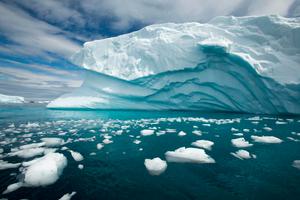Climate
-
Why CO2 ‘Air Capture’ Could Be Key to Slowing Global Warming
Physicist Klaus Lackner has long advocated deploying devices that extract carbon dioxide from the atmosphere to combat climate change. Now, as emissions keep soaring, Lackner says in a Yale Environment 360 interview that such “air capture” approaches may be our last best hope.
-
After Paris, A Move to Rein In Emissions by Ships and Planes
As the world moves to slash CO2 emissions, the shipping and aviation sectors have managed to remain on the sidelines. But the pressure is now on these two major polluting industries to start controlling their emissions at last.
-
As Drought Grips South Africa, A Conflict Over Water and Coal
Facing one of the worst droughts in memory, South Africa’s leaders have doubled down on their support of the water-intensive coal industry. But clean energy advocates say the smartest move would be to back the country’s burgeoning wind and solar power sectors.
-
Saving Amphibians: The Quest To Protect Threatened Species
The decline of the world’s amphibians continues, with causes ranging from fungal diseases to warmer and drier climates. Now, researchers are looking at ways to intervene with triage measures that could help save the most vulnerable populations.
-
Bringing Energy Upgrades To the Nation’s Inner Cities
Donnel Baird has launched a startup that aims to revolutionize how small businesses and nonprofits secure funding for energy efficiency and clean energy projects in low-income neighborhoods. In a Yale Environment 360 interview, he talks about how he plans to bring his vision to dozens of U.S. cities.
-
Climate Consequences
Abrupt Sea Level Rise Looms As Increasingly Realistic Threat
-
Can Uber-Style Buses Help Relieve India’s Air Pollution?
India’s megacities have some the deadliest air and worst traffic congestion in the world. But Indian startups are now launching initiatives that link smart-phone apps and private shuttle buses and could help keep cars and other motorized vehicles off the roads.
-
From Mass Coral Bleaching, A Scientist Looks for Lessons
For climate scientist Kim Cobb, this year’s massive bleaching of coral reefs is providing sobering insights into the impacts of global warming. Yale Environment 360 talked with Cobb about the bleaching events and the push to make reefs more resilient to rising temperatures.
-
Climate Change Adds Urgency to Push to Save World’s Seeds
In the face of rising temperatures and worsening drought, the world’s repositories of agricultural seeds may hold the key to growing food under increasingly harsh conditions. But keeping these gene banks safe and viable is a complicated and expensive challenge.
-
As World Warms, How Do We Decide When a Plant is Native?
The fate of a tree planted at poet Emily Dickinson's home raises questions about whether gardeners can — or should — play a role in helping plant species migrate in the face of rising temperatures and swiftly changing botanical zones.
-
Can We Reduce CO2 Emissions And Grow the Global Economy?
Surprising new statistics show that the world economy is expanding while global carbon emissions remain at the same level. Is it possible that the elusive “decoupling” of emissions and economic growth could be happening?
-
For James Hansen, the Science Demands Activism on Climate
Climate scientist James Hansen has crossed the classic divide between research and activism. In an interview with Yale Environment 360, he responds to critics and explains why he believes the reality of climate change requires him to speak out.
-
On Fuel Economy Efforts, U.S. Faces an Elusive Target
One of President Obama’s signature achievements on climate has been strict standards aimed at improving auto fuel efficiency to nearly 55 miles per gallon by 2025. But credits and loopholes, coupled with low gas prices, may mean the U.S. will fall well short of this ambitious goal.
-
With New Tools, A Focus On Urban Methane Leaks
Until recently, little was known about the extent of methane leaking from urban gas distribution pipes and its impact on global warming. But recent advances in detecting this potent greenhouse gas are pushing U.S. states to begin addressing this long-neglected problem.
-
How Ocean Noise Pollution Wreaks Havoc on Marine Life
Marine scientist Christopher Clark has spent his career listening in on what he calls “the song of life” in the world’s oceans. In an interview with Yale Environment 360, he explains how these marine habitats are under assault from extreme—but preventable—noise pollution.
-
Is Climate Change Putting World’s Microbiomes at Risk?
Researchers are only beginning to understand the complexities of the microbes in the earth’s soil and the role they play in fostering healthy ecosystems. Now, climate change is threatening to disrupt these microbes and the key functions they provide.
-
As Electric Cars Stall, A Move To Greener Trucks and Buses
Low gasoline prices and continuing performance issues have slowed the growth of electric car sales. But that has not stymied progress in electrifying larger vehicles, including garbage trucks, city buses, and medium-sized trucks used by freight giants like FedEx.
-
New Green Challenge: How to Grow More Food on Less Land
If the world is to have another Green Revolution to feed its soaring population, it must be far more sustainable than the first one. That means finding ways to boost yields with less fertilizer and rethinking the way food is distributed.
-
Food Insecurity: Arctic Heat Is Threatening Indigenous Life
Subsistence hunters in the Arctic have long taken to the sea ice to hunt seals, whales, and polar bears. But now, as the ice disappears and soaring temperatures alter the life cycles and abundance of their prey, a growing number of indigenous communities are facing food shortages.
-
How to Talk About Clean Energy With Conservatives
Angel Garcia, of Young Conservatives for Energy Reform, is working to persuade Republicans about the need for renewable energy. In an interview with Yale Environment 360, he explains why his group avoids mentioning climate change when it makes its pitch to conservatives

